2014年重庆市专升本《大学英语》考试大纲
2014年专升本《英语听力》考试大纲
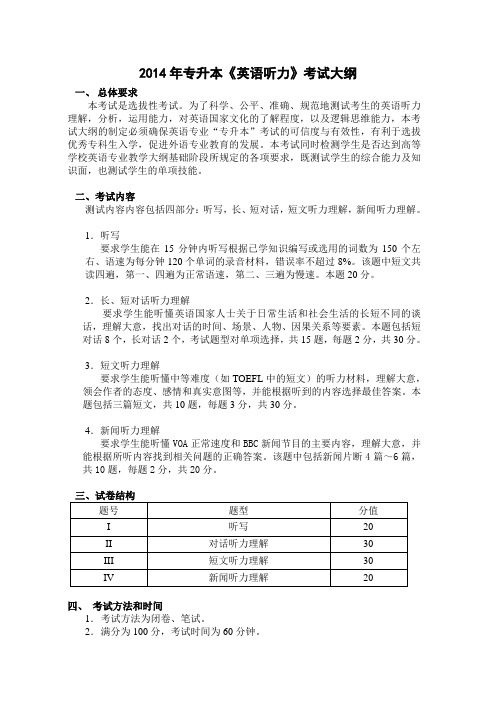
2014年专升本《英语听力》考试大纲一、总体要求本考试是选拔性考试。
为了科学、公平、准确、规范地测试考生的英语听力理解,分析,运用能力,对英语国家文化的了解程度,以及逻辑思维能力,本考试大纲的制定必须确保英语专业“专升本”考试的可信度与有效性,有利于选拔优秀专科生入学,促进外语专业教育的发展。
本考试同时检测学生是否达到高等学校英语专业教学大纲基础阶段所规定的各项要求,既测试学生的综合能力及知识面,也测试学生的单项技能。
二、考试内容测试内容内容包括四部分:听写,长、短对话,短文听力理解,新闻听力理解。
1.听写要求学生能在15分钟内听写根据已学知识编写或选用的词数为150个左右、语速为每分钟120个单词的录音材料,错误率不超过8%。
该题中短文共读四遍,第一、四遍为正常语速,第二、三遍为慢速。
本题20分。
2.长、短对话听力理解要求学生能听懂英语国家人士关于日常生活和社会生活的长短不同的谈话,理解大意,找出对话的时间、场景、人物、因果关系等要素。
本题包括短对话8个,长对话2个,考试题型对单项选择,共15题,每题2分,共30分。
3.短文听力理解要求学生能听懂中等难度(如TOEFL中的短文)的听力材料,理解大意,领会作者的态度、感情和真实意图等,并能根据听到的内容选择最佳答案。
本题包括三篇短文,共10题,每题3分,共30分。
4.新闻听力理解要求学生能听懂VOA正常速度和BBC新闻节目的主要内容,理解大意,并能根据所听内容找到相关问题的正确答案。
该题中包括新闻片断4篇~6篇,共10题,每题2分,共20分。
四、考试方法和时间1.考试方法为闭卷、笔试。
2.满分为100分,考试时间为60分钟。
2014专接本考试大纲

2014专接本考试大纲2014年专接本考试大纲主要针对的是专科生升本科的考试,它涵盖了考试的科目、内容、形式和要求等方面。
以下是2014年专接本考试大纲的详细内容:一、考试科目2014年专接本考试的科目一般包括:1. 语文:考查学生的阅读理解能力、写作能力和语言运用能力。
2. 数学:分为高等数学和线性代数两部分,考查学生的数学基础和逻辑思维能力。
3. 英语:考查学生的英语听说读写能力,包括词汇、语法、阅读和写作。
4. 专业课:根据不同的专业方向,考查学生的专业基础知识和应用能力。
二、考试内容1. 语文:包括现代文阅读、文言文阅读、写作等部分。
现代文阅读主要考查学生对文章的理解、分析和评价能力;文言文阅读则考查学生对古文的翻译和理解能力;写作部分则考查学生的表达和写作能力。
2. 数学:高等数学部分包括微积分、线性代数、概率论与数理统计等内容;线性代数部分则主要考查矩阵运算、向量空间等基础知识。
3. 英语:包括听力、阅读、完形填空、翻译和写作等部分。
听力部分考查学生的英语听力理解能力;阅读部分考查学生的快速阅读和信息提取能力;完形填空考查学生的语境分析和词汇运用能力;翻译部分考查学生的英汉互译能力;写作部分考查学生的英语写作能力。
4. 专业课:根据专业不同,考试内容也有所不同。
一般包括专业基础知识、专业技能和案例分析等。
三、考试形式1. 笔试:大部分科目采用闭卷笔试的形式进行,要求学生在规定时间内完成试题。
2. 口试:部分科目如英语口语,可能采用口试的形式进行,考查学生的口语表达能力。
3. 实践操作:对于某些专业课程,可能需要进行实践操作考试,考查学生的实际操作能力。
四、考试要求1. 掌握基础知识:考生需要对所学专业的基础知识有深入的了解和掌握。
2. 具备分析和解决问题的能力:考生应具备分析问题和解决问题的能力,能够在考试中灵活运用所学知识。
3. 注重实践应用:考生应注重将理论知识与实践相结合,提高自身的实践操作能力。
2014年普通高等学校招生全国统一考试英语大纲的说明
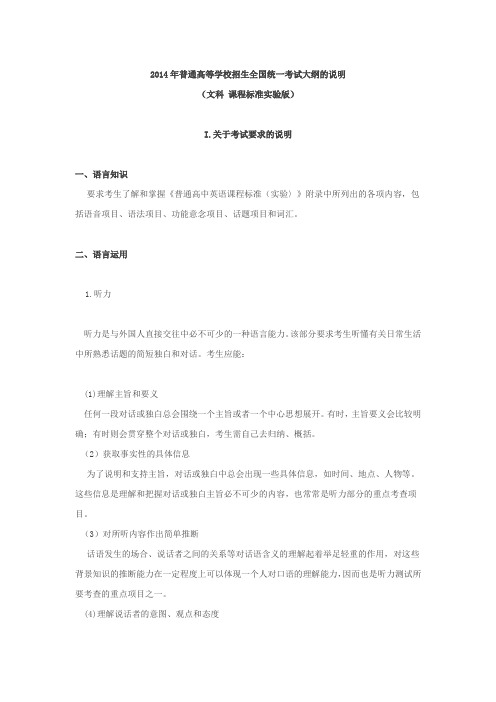
2014年普通高等学校招生全国统一考试大纲的说明(文科课程标准实验版)I.关于考试要求的说明一、语言知识要求考生了解和掌握《普通高中英语课程标准(实验〉》附录中所列出的各项内容,包括语音项目、语法项目、功能意念项目、话题项目和词汇。
二、语言运用1.听力听力是与外国人直接交往中必不可少的一种语言能力。
该部分要求考生听懂有关日常生活中所熟悉话题的简短独白和对话。
考生应能:(1)理解主旨和要义任何一段对话或独白总会围绕一个主旨或者一个中心思想展开。
有时,主旨要义会比较明确;有时则会贯穿整个对话或独白,考生需自己去归纳、概括。
(2)获取事实性的具体信息为了说明和支持主旨,对话或独白中总会出现一些具体信息,如时间、地点、人物等。
这些信息是理解和把握对话或独白主旨必不可少的内容,也常常是听力部分的重点考查项目。
(3)对所听内容作出简单推断话语发生的场合、说话者之间的关系等对话语含义的理解起着举足轻重的作用,对这些背景知识的推断能力在一定程度上可以体现一个人对口语的理解能力,因而也是听力测试所要考查的重点项目之一。
(4)理解说话者的意图、观点和态度一般来讲,说话者总会有说话的意图,或是提出或回答问题,阐述自己的想法,或是表明自己的态度或意见,对此的理解或推断在一般交往中非常重要。
有时,说话者的意图或观点是明说出来的,有时则隐含在对话的字里行间,需要听者自己去揣摩、推断。
2. 阅读理解阅读文章是我国考生接触外语的最主要途径,因此,阅读理解在试卷中占权重较大。
该部分要求考生读懂熟悉的有关日常生活话题的简短文字材料,例如公告、说明、广告以及书、报、杂志中关于一般性话题的简短文章。
考生应能:(1)理解主旨和要义任何一篇文章都会有一个主旨要义。
有时从文章的第一个段落,甚至第一个句子即可得出文章的主旨要义,从这一段或这个句子读者会知道文章描述的是谁或什么(即文章的主题),亦会了解作者希望读者了解主题方面的哪些内容。
有时,文章的主旨要义则需从文章的字里行间进行推断。
2014年专升本英语试题及答案
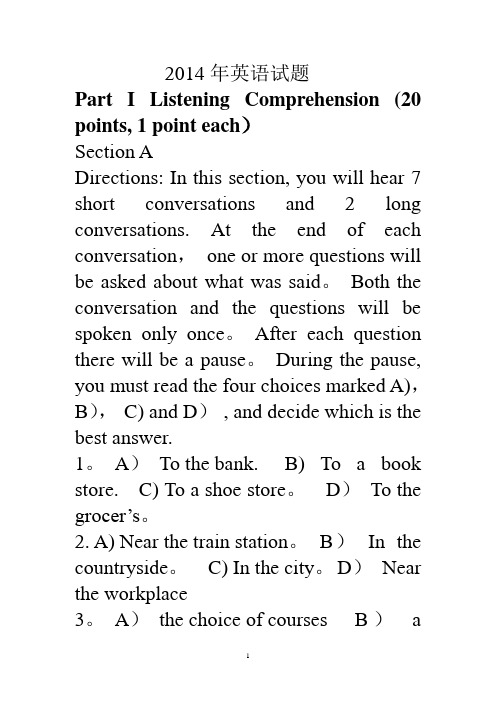
2014年英语试题Part I Listening Comprehension (20 points, 1 point each)Section ADirections: In this section, you will hear 7 short conversations and 2 long conversations. At the end of each conversation,one or more questions will be asked about what was said。
Both the conversation and the questions will be spoken only once。
After each question there will be a pause。
During the pause, you must read the four choices marked A),B),C) and D), and decide which is the best answer.1。
A)To the bank. B) To a book store. C) To a shoe store。
D)To the grocer’s。
2. A) Near the train station。
B)In the countryside。
C) In the city。
D)Near the workplace3。
A)the choice of courses B) aday course C) an evening course D) their work4. A) The pear. B)The weather。
C)The sea food. D) The cold。
5。
A) George’s wife.B) George’s father.C) George's brother D) George’s wife’s father.6。
重庆大学2014硕士生英语复习大纲(B类)
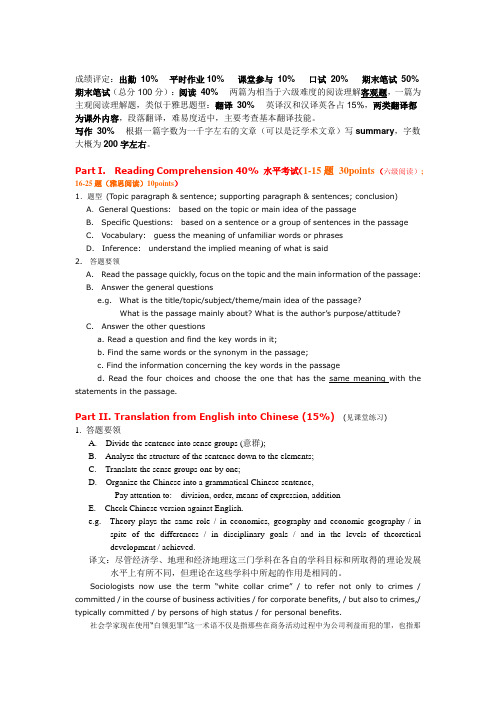
成绩评定:出勤10% 平时作业10% 课堂参与10% 口试20% 期末笔试50%期末笔试(总分100分):阅读40% 两篇为相当于六级难度的阅读理解客观题,一篇为主观阅读理解题,类似于雅思题型:翻译30%英译汉和汉译英各占15%,两类翻译都为课外内容,段落翻译,难易度适中,主要考查基本翻译技能。
写作30% 根据一篇字数为一千字左右的文章(可以是泛学术文章)写summary,字数大概为200字左右。
Part I. Reading Comprehension 40% 水平考试(1-15题30points (六级阅读); 16-25题(雅思阅读)10points)1.题型(Topic paragraph & sentence; supporting paragraph & sentences; conclusion) A.General Questions: based on the topic or main idea of the passageB. Specific Questions: based on a sentence or a group of sentences in the passageC. Vocabulary: guess the meaning of unfamiliar words or phrasesD. Inference: understand the implied meaning of what is said2. 答题要领A. Read the passage quickly, focus on the topic and the main information of the passage:B. Answer the general questionse.g. What is the title/topic/subject/theme/main idea of the passage?What is the passage mainly about? What is the author’s purpose/attitude?C. Answer the other questionsa. Read a question and find the key words in it;b. Find the same words or the synonym in the passage;c. Find the information concerning the key words in the passaged. Read the four choices and choose the one that has the same meaning with the statements in the passage.Part II. Translation from English into Chinese (15%) (见课堂练习)1. 答题要领A. Divide the sentence into sense groups (意群);B. Analyze the structure of the sentence down to the elements;C. Translate the sense groups one by one;D. Organize the Chinese into a grammatical Chinese sentence,Pay attention to: division, order, means of expression, additionE. Check Chinese version against English.e.g. Theory plays the same role / in economics, geography and economic geography / inspite of the differences / in disciplinary goals / and in the levels of theoreticaldevelopment / achieved.译文:尽管经济学、地理和经济地理这三门学科在各自的学科目标和所取得的理论发展水平上有所不同,但理论在这些学科中所起的作用是相同的。
2014年普通高等学校招生统一考试 大纲英语

2014年普通高等学校招生全国统一考试英语(大纲卷)英语第Ⅰ卷第一部分听力(共两节,满分30分)见江苏卷第二部分英语知识运用(共两节,满分45分)第一节单项填空(共15小题:每小题1分,满分15分)从A、B、C、D四个选项中.选出可以填入空白处的最佳选项,并在答题卡上将该项涂黑。
21. --- I’m sorry for breaking the cup.--- Oh, ____ --I’ve got plenty.A. forget itB. my pleasureC. help yourselfD. pardon me22. Unless extra money____, the theatre will close.A. was foundB. findsC. is foundD. found23. Toady there are more airplanes _____ more people than ever before in the skies.A. carryB. carryingC. carriedD. to be carrying24. Exactly ____ the potato was introduced into Europe is uncertain, but it was probably around 1565.A. whetherB. whyC. whenD. how25. --- Who’s that at the door?--- _____ is the milkman.A. HeB. ItC. ThisD. That26. _____ the nurses want a pay increase, they want reduced hours as well.A. Not do onlyB. Do not onlyC. Only not doD. Not only do27. Raymond’s parents wanted him to have ______ possible education.A. goodB. betterC. bestD. the best28. I think Mrs. Stark could be ______ between 50 and 60 years of age.A. anywhereB. anybodyC. anyhowD. anything29. September 30 is the day ______ which you must pay your bill.A. byB. forC. withD. in30. Although you _____ find bargains in London, it’s not generally a cheap place to shop.A. shouldB. needC. mustD. can31. Caroline doesn’t have a gift for music, but she _____ it with hard work.A. goes back onB. takes away fromC. makes up forD. catches up with32. The reports went missing in 2012 and nobody ______ them since.A. seesB. sawC. has seenD. had seen33. _____ me tomorrow and I’ll let you know the lab result.A. CallingB. CallC. To callD. Having called34. Henry was away from home for quiet a bit and _____ saw his family.A. frequentlyB. seldomC. alwaysD. usually35. --- What did you do last weekend?--- Nothing _____.A. muchB. elseC. everD. yet第二节完形填空(共20小题;每小题1.5分,满分30分)阅读下面短文.从短文后各题所给的四个选项(A、B. C和D )中,选出可以填入空白处的最佳选项,并在答题卡上将该项小涂黑。
考试大纲
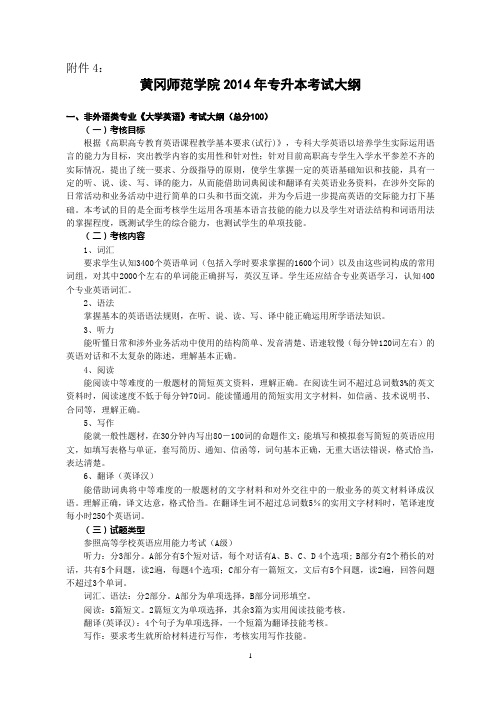
附件4:黄冈师范学院2014年专升本考试大纲一、非外语类专业《大学英语》考试大纲(总分100)(一)考核目标根据《高职高专教育英语课程教学基本要求(试行)》,专科大学英语以培养学生实际运用语言的能力为目标,突出教学内容的实用性和针对性;针对目前高职高专学生入学水平参差不齐的实际情况,提出了统一要求、分级指导的原则,使学生掌握一定的英语基础知识和技能,具有一定的听、说、读、写、译的能力,从而能借助词典阅读和翻译有关英语业务资料,在涉外交际的日常活动和业务活动中进行简单的口头和书面交流,并为今后进一步提高英语的交际能力打下基础。
本考试的目的是全面考核学生运用各项基本语言技能的能力以及学生对语法结构和词语用法的掌握程度,既测试学生的综合能力,也测试学生的单项技能。
(二)考核内容1、词汇要求学生认知3400个英语单词(包括入学时要求掌握的1600个词)以及由这些词构成的常用词组,对其中2000个左右的单词能正确拼写,英汉互译。
学生还应结合专业英语学习,认知400个专业英语词汇。
2、语法掌握基本的英语语法规则,在听、说、读、写、译中能正确运用所学语法知识。
3、听力能听懂日常和涉外业务活动中使用的结构简单、发音清楚、语速较慢(每分钟120词左右)的英语对话和不太复杂的陈述,理解基本正确。
4、阅读能阅读中等难度的一般题材的简短英文资料,理解正确。
在阅读生词不超过总词数3%的英文资料时,阅读速度不低于每分钟70词。
能读懂通用的简短实用文字材料,如信函、技术说明书、合同等,理解正确。
5、写作能就一般性题材,在30分钟内写出80-100词的命题作文;能填写和模拟套写简短的英语应用文,如填写表格与单证,套写简历、通知、信函等,词句基本正确,无重大语法错误,格式恰当,表达清楚。
6、翻译(英译汉)能借助词典将中等难度的一般题材的文字材料和对外交往中的一般业务的英文材料译成汉语。
理解正确,译文达意,格式恰当。
在翻译生词不超过总词数5%的实用文字材料时,笔译速度每小时250个英语词。
2014年版 专升本 英语复习题及答案
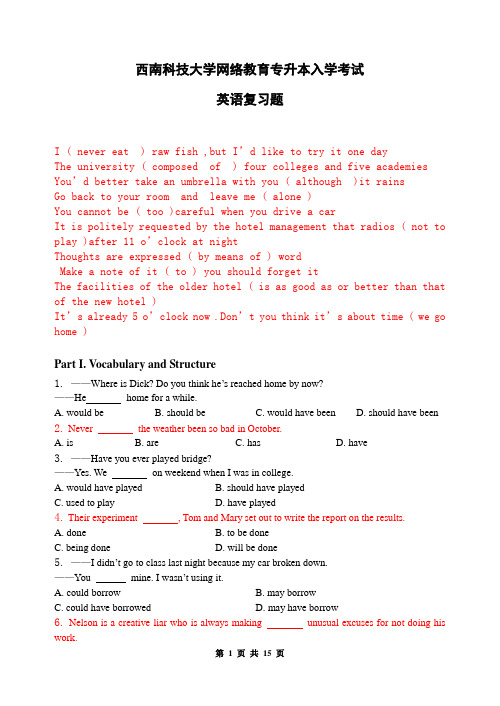
西南科技大学网络教育专升本入学考试英语复习题I ( never eat ) raw fish ,but I’d like to try it one dayThe university ( composed of ) four colleges and five academies You’d better take an umbrella with you ( although )it rainsGo back to your room and leave me ( alone )You cannot be ( too )careful when you drive a carIt is politely requested by the hotel management that radios ( not to play )after 11 o’clock at nightThoughts are expressed ( by means of ) wordMake a note of it ( to ) you should forget itThe facilities of the older hotel ( is as good as or better than that of the new hotel )It’s already 5 o’clock now .Don’t you think it’s about time ( we go home )Part I. Vocabulary and Structure1.——Where is Dick? Do you think he’s reached home by now?——He home for a while.A. would beB. should beC. would have beenD. should have been2. Never the weather been so bad in October.A. isB. areC. hasD. have3.——Have you ever played bridge?——Yes. We on weekend when I was in college.A. would have playedB. should have playedC. used to playD. have played4. Their experiment , Tom and Mary set out to write the report on the results.A. doneB. to be doneC. being doneD. will be done5.——I did n’t go to class last night because my car broken down.——You mine. I wasn’t using it.A. could borrowB. may borrowC. could have borrowedD. may have borrow6. Nelson is a creative liar who is always making unusual excuses for not doing his work.A. acrossB. awayC. offD. up7. Since you feel so strongly about this matter, you should make your views to other committee members.A. knowB. knowingC. being knownD. known8. He is not a stranger for me. I have met him on several .A. situationsB. environmentsC. occasionsD. positions9. This disease is second only heart attack as a cause of death all over the world.A. toB. ofC. withD. from10.——I’m afraid I have to go now, Jim.——I’d rather you go alone. I t’s already too late.A. don’tB. didn’tC. wouldn’tD. shouldn’t11. This is for ten of us to sit at. Please get us a larger one.A. too small a tableB. a too small tableC. a such small tableD. such small a table12. If you’re looking for a fully-furnished room to rent, I think there’s a(n) apartment in my building.A. emptyB. bareC. vacantD. free13. The manager promised to keep me how our business was going on.A. informingB. informedC. to informD. to be informed14. The boys spent the whole morning possible answers to the question.A. discussB. to discussC. discussingD. discussed15.More and more families have moved elsewhere because they cannot the noise from the neighboring airport.A. come up withB. put up withC. catch up withD. keep up with16.The traditional approach ________ with complex problem is to break them down into smaller, more easily managed problems.A. to dealingB. in dealingC. dealingD. to deal17. We forget to bring our tickets, but please let us enter,______?A. do youB. will youC. can weD. shall we18.Shelly had prepared carefully for her biology examination so that she could be sure of passing it on her first ______.A. intentionB. attemptC. purposeD. desire19. The ancient Egyptians are supposed _______ rockets to the moon.A. to sendB. to be sendingC. to have sentD. to have been sending20. ______you eat the correct foods ______ be able to keep fit and stay healthy.A. Only if; you willB. Only if; will youC. Unless; you willD. Unless; will you21. Staying in a hotel costs ______ renting a room in a dormitory for a week.A. twice moreB. twice as much asC. as much twice asD. as much as twice22. The little girl could not _____ the attraction of the piece of the chocolate.A. consistB. persistC. insistD. resist23. She was so ____ in her job that she didn’t hear anybody knocking at the door.A. attractedB. absorbedC. drawnD. concentrated24. Many children, _____ parents are away working in big cities, are taken good care of in the village.A. of themB. whoseC. theirD. with whom25. He _____ at the boy into silence.A. glancedB. observedC. watchedD. almost26. It is kind ______ you to do me a favor at this moment.A. toB. forC. ofD. about27. You cannot see the patient at the moment; he is now _______ medical treatment.A. inB. onC. underD. at28. He promised that he would _____ to get us two tickets of the soccer game.A. manageB. fulfillC. accomplishD. succeed29. He got a job with the corporation in 2000 and has worked there ______.A. sinceB. ever sinceC. ever beforeD. till then30. My mobile phone isn’t in my bag. Where ______ I have put it ?A. canB. mustC. shouldD. would31. Mr.Verder never thought that he would become a member of the board of directors because of his _____ origin.A. humbleB. previousC. criticalD. false32. It’s bad policy for developing countries to sacrifice environmental protection to ________ economic growth.A. discourageB. weakenC. promoteD. create33. He did it _____ gratitude for everything she had done for him.A. withB. inC. with regard toD. out of34. The ship ______ form behind the fog.A. droveB. emergedC. passedD. turned35.I’d rather marry a man who had a(n) _______ of humor than one who was very attractive.A. capabilityB. sightC. knowledgeD. sense36. We’ll visit Europe next year _______ we have enough money.A. lestB. untilC. unlessD. provided37.I’m sorry I can’t see you immediately; but if you’d like to take a seat, I’ll be with you ______ .A. for a momentB. in a momentC. for the momentD. at the moment38. We love peace, yet we are not the kind of people to yield ______ any military threat.A. upB. toC. inD. at39. The internet users visiting our website are _______ young people between the age of 13 and20.A. mostB. almostC. mostlyD. at most40.There are several means of mass communication. The newspaper is one .Television is _______.A. the otherB. the anotherC. otherD. another41. We had borrowed two VCDs but didn’t have time to watch ______ of them.A. someB. eitherC. allD. neither42. Would you please let me finish my words? Don’t ______ in the middle of a sentence.A. put me offB. cut me offC. keep me offD. get me off43. In the first semester, I asked my teacher _______.A. what courses should I takeB. what courses I should takeC. I should take what coursesD. should I take what courses44. There aren’t many wild pandas ______ in the world today.A. liveB. livingC. to liveD. lived45. Don’t ask him how old he is-he’s really _______ about it.A. sensitiveB. carelessC. cautiousD. anxiousPart II. Writing46. Directions: For this part, you are supposed to write a composition in English in 100-120 words based on the following information. Remember to write it clearly.以“Failure and Success”为题写一篇短文,内容包括:(1)人生遭遇失败很常见;(2)每个人都渴望成功;(3)失败走向成功的必经之路。
- 1、下载文档前请自行甄别文档内容的完整性,平台不提供额外的编辑、内容补充、找答案等附加服务。
- 2、"仅部分预览"的文档,不可在线预览部分如存在完整性等问题,可反馈申请退款(可完整预览的文档不适用该条件!)。
- 3、如文档侵犯您的权益,请联系客服反馈,我们会尽快为您处理(人工客服工作时间:9:00-18:30)。
2014年重庆市专升本《大学英语》考试大纲
一、考试大纲适用对象及考试性质
本大纲适用于重庆市普通高校申请“专升本”的高职高专学生,目的在于考核学生达到《高等学校英语专业英语教学大纲》(基础阶段)的要求或《高职高专教育英语课程教学基本要求》A级以上要求的情况,检测学生是否具备本科阶段的英语学习能力。
按本大纲进行的考试系选拔性考试,其结果将作为重庆市普通高校高职高专学生申请“专升本”的成绩依据。
二、考试形式
(一)试卷题型及分值分布
序号考试项目题号考试内容题型分值
I 听力理解 1—15 对话、实用会话、短文多项选择、填空 15分
II 词汇和结构 16—30 词汇、语法结构多项选择、填空 15分
III 阅读理解 31—50 理解语篇,包括一般性和应用性文字材料多项选择、填空、匹配 40分
IV 翻译 51—56 句子和段落句子翻译、段落翻译 15分
V 写作 57 简历表、申请书、邀请信、通知等写作书写、套写、填写 15分
非英语专业考生只完成Ⅰ-Ⅴ部分,合计100分,按120分折算计入总分
VI 附加部分 Section A 短文阅读约200词,辨认错误并改正错误辨错、改错 10分
Section B 短文阅读约200词,写作约80词概要、提纲、摘要 10分
英语专业考生完成Ⅰ-Ⅵ部分,合计100分,按120分折算计入总分本考试主要考核考生的语言基础知识和应用技能。
考试项目共六个部分,即听力理解、词汇和结构、阅读理解、翻译、写作、附加部分,见下表。
试卷题型及分值分布表
(二)考试方式
考试采取闭卷笔试,考试时间为120分钟。
非英语专业试卷总分为100分,按120分折算;英语专业试卷总分为120分。
(三)考试内容及要求
(一)听力理解(Part Ⅰ Listening Comprehension)
考核考生理解所听对话、会话和短文的能力。
听力材料语速为每分钟130词。
听力材料为一般语言材料和实用交流材料。
本部分共15小题,分值15分,题型为多项选择题和填空题。
(二)词汇和结构(Part Ⅱ VocabularyStructure)
考核考生词汇和语法结构的运用能力。
本部分共15小题,分值15分,题型为多项选择题和填空题。
(三)阅读理解(Part Ⅲ Reading Comprehension)
考核考生通过阅读获取信息的能力。
阅读内容为一般阅读材料和常见实用性文字材料。
本部分共4篇短文,总词汇量约1300词,共
20小题,分值40分,题型为多项选择题,填空题和匹配题。
其中前2篇阅读材料共10小题,分值20分,题型为多项选择题; 第三篇阅读材料共5小题,分值10分,题型为填空题; 第四篇阅读材料共5小题,分值10分,题型为匹配题。
(四)翻译(Part Ⅳ Translation)
考核学生英汉互译能力。
本部分由汉译英和英译汉两部分组成。
汉译英为一般性句子翻译,共5小题,分值5分,题型为多项选择题;英译汉为实用性段落翻译,约140词,1小题,分值10分,题型为段落翻译。
(五)写作(Part Ⅴ Writing)
考核考生应用文体的写作能力。
文体包含通知、便条、海报、多种简短信函、简历表、申请表等,写作词量为100词,分值15分,题型为书写、套写或填写。
(六)附加考试(Part Ⅵ Additional Tasks)
本部分由Section A和Section B组成,考核英语专业考生在基础学习阶段实际运用英语语言的能力。
Section A考核考生在短文篇章水平上的辨错和改错能力。
考试材料为英语国家出版的中等难度的各种材料和文章节选,约200词,分值10分,题型为辨错和改错。
Section B 考核考生在阅读理解的基础上归纳总结的能力。
短文阅读材料约200词,写作词量为80词,分值10分,题型为归纳写作。
非英语专业考生只完成前五部分,其他部分的答题不计分;英语
专业考生完成所有部分。
参考书目
1.编写组新编实用英语综合教程(第三版)(普通高等学校“十一五”国家级规划教材)高等教育出版社 2012年
2.翟象俊等 21世纪大学实用英语综合教程(全新版)(普通高等学校“十一五”国家级规划教材)复旦大学出版社 2011年
3.郑树棠新视野英语教程(第二版)(普通高等学校“十一五”国家级规划教材)外语教学与研究出版社 2011年
4.贺雪娟职通商务英语综合教程高等教育出版社 2010年
5.彭丽. 黄光芬现代职场英语大连理工大学出版社 2011年
6.赵萱实用英语应用文写作教程高等教育出版社 2011年。
